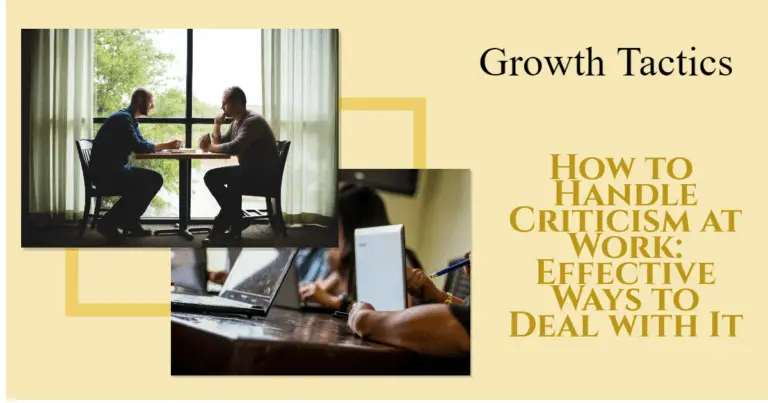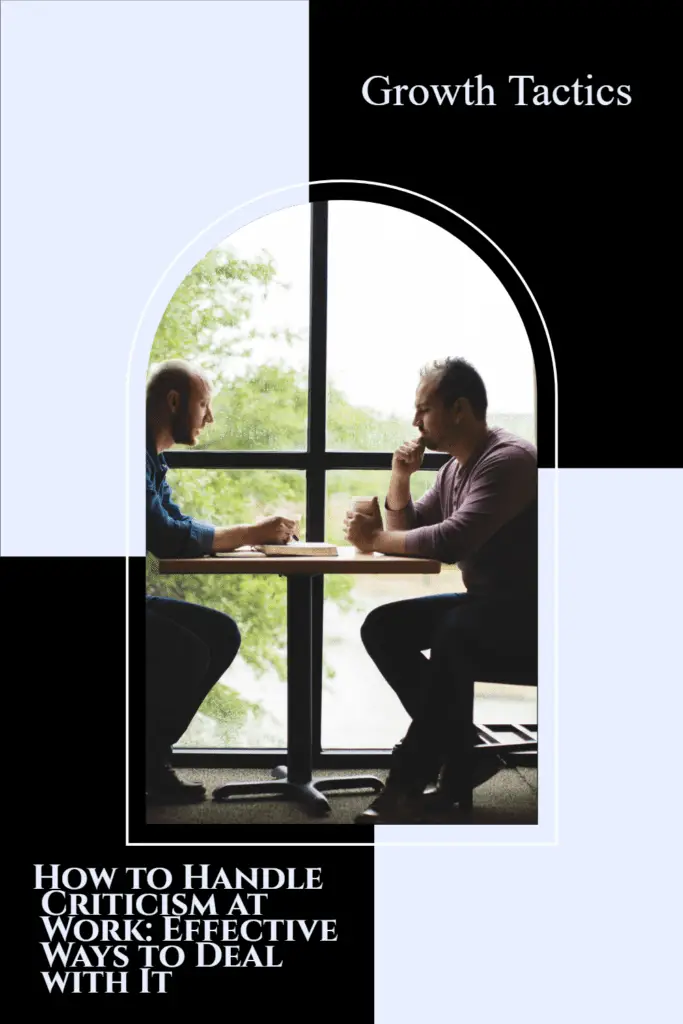I understand how challenging it can be to receive feedback, especially when it feels like a personal attack. However, I’ve learned that handling criticism with grace and positivity can lead to personal growth and improved professional relationships. In this article, I’ll share effective strategies on how to handle criticism at work, helping you navigate these situations with confidence.
Jump To Section
Understanding the Power of Properly Handling Criticism at Work
Constructive criticism holds the potential to propel your professional growth. It provides valuable insights, allowing you to identify areas for improvement and make positive changes. Remember, constructive criticism is not a personal attack – it’s an opportunity to learn and evolve.
Reacting Mindfully: Stay Calm and Ask Questions
Receiving criticism can stir up emotions, but it’s essential to remain calm. Take a deep breath and listen actively to what is being said. Rather than reacting defensively, consider asking clarifying questions. Seek to understand the specific concerns and suggestions for improvement. By asking questions, you demonstrate your willingness to engage in a constructive dialogue, showing your commitment to personal and professional growth.
Embrace a Growth Mindset: Learn from Criticism
Adopting a growth mindset allows you to view criticism as an opportunity for development. Remember that receiving feedback is not a reflection of your worth as a person or employee. Instead, it presents a chance to enhance your skills and abilities. Embrace the idea that you can learn from every criticism, boosting your confidence and resilience in the process.
Separate Personal Attacks from Constructive Feedback
Not all criticism is constructive. Occasionally, you may encounter personal attacks disguised as feedback. It’s crucial to distinguish between the two. Constructive feedback focuses on specific behaviors or actions, providing suggestions for improvement. On the other hand, personal attacks are subjective, unrelated to your work performance. If you sense a personal attack, remain professional and redirect the conversation towards actionable feedback.
Responding with Grace: Addressing Defensiveness
Defensiveness is a natural response to criticism, but it can hinder your growth and damage professional relationships. Instead, practice self-awareness and seek to address your defensive tendencies. Take a moment to reflect on the feedback, and if you feel defensiveness rising, make a conscious effort to remain open-minded. Remember, criticism offers insights that can help you become the best version of yourself.
Seek Feedback Regularly
Handling criticism effectively is an ongoing process. Make it a habit to regularly seek feedback from your colleagues and supervisors. By proactively seeking input, you demonstrate your commitment to growth and improvement. Actively seeking feedback can also lead to more open and supportive communication within your workplace. Remember, feedback is a gift that can help you optimize your performance.
Building Strong Relationships with Co-workers
Good relationships with your co-workers foster an environment of trust, where constructive criticism can be freely exchanged. Cultivate open lines of communication, listen actively, and provide support to your colleagues. When you approach criticism from a foundation of respect and trust, it becomes easier to collaborate, learn from one another, and grow together as a team.
Embrace a Positive Attitude
Approach criticism with a positive mindset. View it as an opportunity for growth and improvement rather than a personal failure. Maintaining a positive attitude will help you navigate through the feedback with resilience and determination.
Focus on the Behavior, Not the Person
When receiving criticism, remember that it is aimed at improving your work performance, not attacking your character. Separate yourself from the feedback and focus on the specific behaviors or actions that need refinement. This way, you can address the feedback objectively and make necessary adjustments.
Take Time to Process
It’s okay to take some time to process and reflect upon the feedback before responding. This will ensure that your reaction is thoughtful and composed rather than impulsive. Use this time to gain clarity and consider how you can incorporate the feedback effectively.
Take Action and Implement Feedback
Don’t let criticism go to waste. Use it as an opportunity to take action and implement the suggested changes. Show your commitment to growth by actively seeking ways to improve and demonstrating progress based on the feedback received.
Seek Support from a Trusted Colleague or Mentor
If criticism becomes overwhelming, reach out to a trusted colleague or mentor for support and guidance. They can provide a fresh perspective, offer advice, and help you process the feedback in a supportive environment.
Practice Self-Reflection
Regularly engage in self-reflection to evaluate your own performance and identify areas for improvement. Actively seeking self-improvement demonstrates your dedication to growth and allows you to make proactive changes before criticism arises.
Develop Strong Communication Skills
Enhance your communication skills to effectively receive and deliver feedback. Cultivate active listening, empathy, and clarity in your communication style. By fostering a positive feedback culture, you can create an environment where everyone feels comfortable offering and receiving criticism constructively.
Celebrate Your Accomplishments
While criticism is important for growth, don’t forget to celebrate your achievements along the way. Acknowledge your progress and successes to boost your confidence. Recognizing your accomplishments will provide you with a positive perspective and the motivation to continue improving.
Learn from Mistakes
Mistakes are valuable learning opportunities. When criticism highlights areas where you’ve fallen short, embrace it as a chance to learn from your mistakes. By accepting responsibility and taking steps to improve, you’ll demonstrate your dedication to personal and professional growth.
Be Patient and Persistent
Handling criticism effectively takes time and practice. Be patient with yourself as you navigate this journey. It’s normal to face ups and downs along the way, but with persistence, you’ll develop a resilient mindset and become better equipped to handle criticism in a constructive manner.
How to Tell Fair From Unfair Criticism
Being able to identify the difference allows you to separate valuable insights from baseless attacks. In this section, I’ll share some practical tips to help you navigate between fair and unfair criticism.
Understanding the Intent Behind the Criticism
Experience has taught me that understanding the intent behind criticism is crucial in determining its fairness. Ask yourself: Is the person providing feedback genuinely interested in your growth and improvement? Are they offering suggestions for better approaches? If the intention is to help you develop and succeed, the criticism is likely fair.
Evaluating the Specificity of the Feedback
Fair criticism is usually specific and focuses on particular actions or behaviors. It provides clarity on what you should change or improve. On the other hand, unfair criticism tends to be vague or general, lacking specific examples or suggestions. If the feedback lacks specificity and fails to guide you toward improvement, it may lean more toward unfairness.
Considering the Source and Expertise
Consider the expertise and credibility of the person offering the criticism. Are they knowledgeable in the subject matter? Do they have experience or a track record of success in your field? Someone with relevant expertise is more likely to provide fair and valuable feedback compared to someone who lacks understanding or authority in the area.
Assessing the Tone and Delivery
The tone and delivery of criticism can greatly influence its fairness. Fair criticism is delivered with empathy and respect, focusing on the issue at hand rather than attacking you personally. It aims to be constructive and offers suggestions for improvement. Unfair criticism, on the other hand, may be delivered in a harsh or demeaning manner, attempting to belittle or hurt you. Take note of the tone and consider whether it aligns with constructive intentions.
Seeking Multiple Perspectives
Gaining different perspectives is essential when assessing the fairness of criticism. Expertise taught me that seeking input from trusted colleagues or mentors can provide valuable insights. They can help you evaluate whether the criticism is reasonable and offer alternative viewpoints. By incorporating multiple perspectives, you can determine if the feedback you received is fair or potentially biased.
Trusting Your Own Judgment
Remember, you are the ultimate judge of the fairness of criticism. Trust your instincts and expertise. Assess the feedback objectively and consider how it aligns with your values, goals, and professional growth. Don’t dismiss criticism simply because it challenges you, but also don’t accept it blindly. Trust yourself to make a judgment based on a careful evaluation of the situation.
Conclusion
Handling criticism at work is a valuable skill that empowers personal and professional growth. By embracing constructive criticism, staying calm, adopting a growth mindset, and addressing defensiveness, you can navigate these challenging situations with confidence and grace. Remember, every critique presents an opportunity for improvement. Embrace the feedback, learn from it, and let it contribute to your ongoing success in the workplace.


